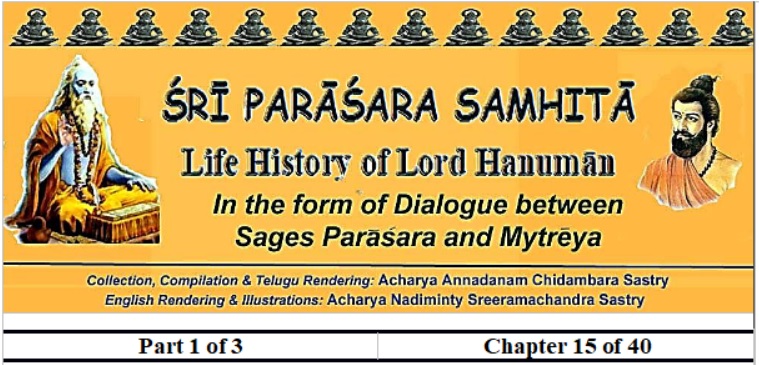
15th Chapter (Pañcadaśa Paţalah)
“The Story of Vijaya”
(Vijayacaritamm)

श्रीमैत्रये :
श्लोक:।।
हनुमन्मंत्रराजस्य द्वादशाक्षरसंज्ञिन:
प्रभावस्तु परिज्ञात: त्वत्प्रसादान्महामुने।। 1
Mytrēya:
“Oh! Great sage Parāśara! By your grace, I learnt about the positive influence of the 12-lettered dwāadaśśkşrī, the best among Hanumanmantras. (1)
अष्टाक्षरी प्रभावंतु श्रोतुमिच्छामि संप्रति
तत्प्रभावं समाचक्ष्व श्रोतुकामस्य मे प्रभो!
यत्प्रभावेन लोको यं मुच्यते भवबन्धनात्।। 2
I want to hear the influence of the aştākşarī mantra, the positive power of which frees people from the bindings of the mundane world. Kindly narrate that”. (2)
एवं सम्बोधितस्तेन मैत्रेयेण महात्मना
पराशरस्तु तं प्राह विवक्षुर्मन्त्रवैभवम्।। 3
So requested by the pure-souled Mytrēya, equally eager Parāśara told him the greatness of that mantra. (3)
श्रीपराशर:
घन्यो सि कृतकृत्यो सि मैत्रेय! मुनिसत्तम?
यतस्ते बुद्धिमारूढा मंत्रविद्याहनूमत:।। 4
Parāśara:
“Oh! Best among the sages Mytrēya! You are blessed, because the strong urge to learn about the Hanumanmantra knowledge is in you. You are decidedly successful. (4)
मग्नो हमधुना ब्रह्मन् परमानन्दसागरे
स्मारयन् मन्त्रविद्यां हि मां कृतार्थं करोषि यत्।। 5
Oh! Great sage! You made me fondly recapitulate the whole range of Hanumanmantra knowledge and thus enthused me also. Hence, I am feeling like I am in an ocean of great bliss, (5)
तस्मादष्टाक्षरीविद्यां वर्णयिष्ये यथामति:
यद्वर्णनेन सद्यो हं जन्मसाफल्यमाप्नुयाम्।। 6
I will first describe in detail the great 8-lettered knowlwdge (aştākşarī mahāvidyā), teaching of which mantra makes life worthy right away. (6)
आदावष्टाक्षरीमन्त्रसमुद्धारं वदामि ते
गोपनीयं तु यत्नेन योगिनामपि दुर्लभम्।। 7
Let me first tell you the raising (mantrōddhāra) of the great 8-lettered (aştākşarī) mantra. This mantra that is difficult even for yogis to get has to be purposefully kept as a secret. (7)
आदौ प्रणवमुच्चार्यं हनूमद्बीजमुच्चरेत्
आंजनेयपद ज्ञेयं नमश्शब्दं समुच्चरेत्
सो मष्टाक्षर: प्रोक्त: हनूमन्मंत्रसत्तम:।। 8
Reciting first the cosmic resonance ‘Ōmm’, then saying the Hanumān seed (beeja) letter ‘hraomm’, reverently uttering the word ‘añjanēyāya’ (to the son of Añjanā) then one has to say ‘namah’ (I bow). That is the best among Hanumanmantras, the aştākşarī mantra. (8)
तस्यर्षिरीश्वर: प्रोक्त: छन्दोनुष्टुप्तथैव च
हनूमान् देवता प्रोक्ता बीजमामिति कीर्तित:।। 9
The Ŗşi (sage) for this mantra is Ēśwara himself. The meter (chandas) is ‘anuştup’. Hanumān is the deity, while ‘Amm‘ is told to be the seed (beeja) letter. (9)
नमश्शक्तिस्तु विज्ञेया मध्येत्युक्तं तु कीलकम्
श्रीहनूमत्प्रसादार्थं जपेस्तु विनियोजनम्।। 10
Know that, for this mantra, ‘nam’ (to bow) is the power (śakti), the middle part (madhyēti) is the key (kīlakam) and the utilization (viniyōgah) is for the Śrī Hanumat prasāddharthē japa (recital for the benevolence of Lord Hanuman). (10)
त्रिभिराद्यस्वरैदीर्धै बिन्दुक्रान्तैस्तथैव च
अंगुष्ठांद्यंगुलिन्यासान् त्रीन्प्रकुर्वींत मंत्रवित्।। 11
The one reciting the mantara should do finger movements (nyāsa) touching sequentially the thumb (añguşţa), first finger (trajanī) and middle finger (madhyama), simultaneously saying ‘Aamm-Eemm-Oomm’, in the first three classical musical notes (sa- ri- ga). (11)
अवशिष्टांगुलीन्यासमैमौंकुर्यात्तत: परम्
विसर्जनीयमात्रेण करस्य तलपृष्ठयो:। 12
Nyasa of the other two fingers (anāmika and kanişţţika) saying ‘Aimm’ and ‘Aoumm’ followed youching of inside and then outside of the palm saying ‘Ha’ (visarga = : in Devanagari script)). (12)
न्यासं कृत्वा तत: कुर्याद्व्याह्मत्या बन्धनं दिशान्
ततस्तु देवताध्याये देवंरूपामतन्द्रित:।। 13
After performing digbandh (imaginary self-encirclement) by uttering appropriate words (ōmm bhūr bhuvah suvah ….), one has to alertly meditate on the form to be worshipped (Hanumān). (13)
ध्यानम्
आंजनये मतिपाटलाननम्
कांचनाद्रिकमनीयविग्रहम्
पारिजाततरुमूलवासिनम्
भावयामि पवमाननन्दनम्।। 14
Meditation (Dhyan):
Āñjanēyamatipātalānanamm, (On Him! Very reddish faced son of Añjana),
Kāncanādrikamanīyavigrahamm, (Having form like the mighty golden Mount Mēru),
Pārijātatarumūlavāsinamm, (Living at the base of Night-flowering-jasmine tree),
Bhāvayāmi Pavamānnandanam. (Son of Wind God; I meditate). (14)
लक्षसंख्या पुरश्चर्या दशांशं तर्पणं भवेत
हवनं तद्रशांशं स्यात्तद्द्शांशं तु भोजनम्।। 15
Having done systemic reptetions (puraścarya) a 100,000 times, perform 1/10th of that oblation (tarpaņa), 1/10th fire sacrifice (hōma) and in that 10th part gifting food (annadāna). (15)
मधुत्रयेण हवनं कुर्यान्मंत्रविचक्षण:
गोक्षीरैश्शर्करामिश्रैस्तर्पणं तु समाचरेत्।। 16
One adept in the lore of mantras (mantraśāstra) should perform fire sacrifice with three sweeteners (madhutraya = honey, sugar and ghee). (16)
एवं शास्त्रोक्तविधिना जपन्नष्टाक्षरीं मनुम्
अष्टाक्षरीप्रभावेन शुद्धांतकरणो भवेत्।। 17
One reciting thus the 8-lettered mantra as per scriptures narrated above, will become pure-hearted by the influence that aştākşarī mantra. (17)
सिद्धिंच सर्वकार्यस्य प्रसिद्धिजगतांत्रये
अन्ते कैवल्यसंपत्तिर्लभते नात्र संशय:।। 18
Gaining successful fulfillment of all actions, fame in the three worlds, will attain liberation (mōkşa) ultimately (avasānadaśa). (18)
अत्रैवोदाहरंतीयमितिहासं पुरातनम्
सर्वपापहरं नृणां सर्वसंपत्तिकारणम्।। 19
I will narrate an ancient episode as example of removal of all sins and causing all riches. (19)
यो यं श्रवणमात्रेण सकृद्वा मुनिपुंगव!
वक्तारं पृच्छकं श्रोत्रृन् त्रीन् पुनाति न संशय:।। 20
Oh! Best of sages! Mytrēya! This story undoubtedly makes the seeker, the narrator as well as the listener; all the three become sin-free soon after hearing. (20)
आसीत्त्रेतायुगे भूमौ चंद्रकोणं महापुरम्
सर्ववस्तुसमृद्धंत त्रिलोकेषु च विश्रुतम्।। 21
In the Third Time period (trētāyug)n there used to be great city on Earth named Candrakōņa, the most prosperous in the three worlds. (21)
तत्राभूद्विजयोनाम क्षत्रियो रिपुमर्दन:
महाशूरो महेष्वासो युद्धकर्मसमुत्सुक:।। 22
There ruled a king called Vijaya, an expert in destroying enemies. He possessed a praise-worthy bow and enthusiasm for war. (22)
स कदाचिन्महावीरो राज्यमारोप्य नंदने
चक्रमे दिग्जयं कर्तुं विजयो नृपसत्तम:।। 23
Once that great valorous king Vijaya went on war path seeking victory of all directions (digjaitrayātra), leaving the responsibility of his kingdom with his son. (23)
तत: प्रतस्थे नृपतिर्विजयो जयकांक्षया
मध्येमार्गं ददर्शाथ गर्गनाममहामुनिम्।। 24
Then the victory seeking Vijaya met on way a great sage named Garga. (24)
दृष्ट्वा मुनिं नृपाध्यक्ष: तुरंगादवतीर्य स:
दूरे निहितसैन्यस्सन् मुनेरंतिकमाययौ।। 25
Having seen Garga, that best of kings Vijaya got down from the horse and went closer to the sage, keeping hism army at a distance. (25)
तत: कृतानतिर्भूत्वा राजा तस्थौ कृतांजलि:
गर्गो दृष्ट्वा महाराजमब्रवीन्मुनिसत्तम:।। 26
The the king stood with bowed head and folded hands (añjali). The best of ascetics, sage Garga saw him and said so. (26)
इत एहि नृपश्रेष्ठ! कृत आगमनं तव?
कच्चित्ते स्वागतं राजन् सर्वत्र कुशलं ननु।। 27
‘Oh! Best of kings! Come this way. Where are you coming from? Where are you going to be welcomed? Oh! King! Is every one at peace? (27)
कच्चित्ते शत्रुसामंता: प्रयच्छंति बलिं बलात्
इत्युक्तो विजयस्तेन गर्गेण सुमहात्मना
प्रत्युवाच मुनिं राजा विजयो जयंतां वर:।। 28
Do your enemy subordinate kings paying the taxes of their free will?’ So asked by that great soul Garga, Vijaya the best among seekers of victory, replied so. (28)
भवतो नुग्रहाद ब्रह्मन् सर्वे कुशलिनो वयम्
दिग्दिगीषुरहं तात! चंद्रकोणादिहागत:।। 29
‘Oh! Great sage! By your grace, we are all safe. I came this way out of Candrakōņa, intent on winning all the directions. (29)
तव संदर्शनादद्य कृतार्थो स्मि महामुने
इत: परंतु कर्तव्यमुपदिश्य ममाधुना
अनुगृहीष्व दीनं मां त्वमेव शरणं मम।। 30
I became auspicious, thanks to having the luxury of your divine vision. Please be kind and enlighten poor me about my duty. I seek your asylum (śaraņam)’. (30)
एवं संप्रार्थितो गर्गो विजयेन जयार्थिना
उपदेष्टुं हितं तस्य चकमे दीनवत्सल:।। 31
Prayed by Vijaya in this manner, great sage Garga who is always kind to seekers, taught him good things. (31)
हनूमन्मन्त्रराजं च गृहाण विधिवन्मनुम्
आयासमंतरेणैव विजयस्ते भविष्यति।। 32
Oh! Vijaya! Take up the best of Hanumanmantras as usual. You will get easy victory’. (32)
एवमुक्त्वा मुनींद्रस्तु प्रादादष्टाक्षरंमनुम्
यथाबीजंयथान्यासं मंत्रोद्धारं प्रणीतवान्।। 33
So saying, great sage Garga taught him the Hanumān aştākşarī mantra along with its raising (uddhāra) and body part and hand movements (nyāsa). (33)
उपदिष्टं महामन्त्रं गर्गेण सुमहात्मना
प्रतिजग्राह राजेन्द्रो निगृहीतेन्द्रियस्तदा।। 34
Then the best of kings Vijaya learnt the mantra taught by the Guru while remaining in control of his senses. (34)
गृहीत्वा मंत्रराजं तु जजापाष्टोत्तरं शतम्
गुरुदैवतमंत्रेषु समविश्वासगौरवात्।। 35
Having obtained the mantra, he recited it 108 times with deep reverence towards the Guru, the mantra and the god (Hanumān). (35)
जप्तमात्रे महामंत्रे हनुमान्मारुतात्मज:
आविर्बभूव तस्याग्रे सुग्रीवादिसमन्वित:।। 36
As Hanumān recited that great mantra, Lord Hanumān divinely appeared before him along with Sugriva and others. (36)
तमागतं हनूमंतं दृष्ट्वा नृपतिनन्दन:
साष्टांगप्रणतो भूत्वा तुष्टाव प्रयतांजलि:।। 37
The king Vijaya performed prostrate at the feet of Lord Hanumān, folded his hands and sang invocation in praise. (37)
चतुर्मुखष्षण्मुखो वा सहस्रवदनो पि वा
यथा विस्मयमापेदे प्रशशंस तथा नृप:।। 38
Vijaya sang invocation extempore, better than the Creator Brahma, Kumāraswāmy and the great serpent Ādiśēşa, even though he has just one face, (38)
तस्य स्तवेन सन्तुष्टो वायुसूनुस्तमब्रवीत्
अनेन स्तोत्रपाठेन प्रीतो स्मि नृपनन्दन! 39
Happy with the laudatory invocation by Vijaya, the son of Añjana said to him, ‘Oh! Prince! Your invocation satisfies me. (39)
वरं वरय भद्रं ते मा कुरुष्वात्र संशय:।। 40
Seek a boon without hesitation’. (40)
इत्युक्तो नृपशार्दूलो दैवतेन हनूमता
प्रत्युवाच विनीतस्मन् विजयो वदतां वर:।। 41
So instructed by Lord Hanumān, that good king Vijaya said so with reverence. (41)
स्वामिन्नद्य कृतार्थो स्मि तवसंदर्शनादहम्
श्रेयस्स्यादिदमत्यर्थं ब्रह्मद्यैरपि दुर्लभम्।। 42
‘Oh! Lord! I became auspicious by your very divine vision (darśan). This itself is very good for the wellbeing, which is difficult to get even to Brahma and others. (42)
किंतु सद्यो जिगीषास्ति मुसलाग्रमतेर्मम
यथा मदीप्सितसिद्ध्ये यथा मयि दयां कुरु।। 43
But my pestle-head like (beating) nature make me wish to win all the worlds. Please grant me that my wish is fulfilled’. (43)
इति संप्रार्थितो राज्ञा हनुमान्मारुतात्मज:
उवाच विजयं देवो भक्तानुग्रहतत्पर:।। 44
So beseeched by the king, Lord Hanumān being partial to his devotees, said so. (44)
विजयस्व यथेच्छं वै दिशो दश महामते
किंत्विदानीं दिशोजेतुं न यतस्व नराधिप।। 45
‘Oh! Wise one! Win over ten directions. But, Hing! Do not try to win right now. (45)
द्वापराख्ये युगे राजन् कार्यंहि महदुद्यमम्
त्वयाविना महाबाहो तत्कार्यं नैव सिध्यति।। 46
Oh! King! There is a great task to be performed in the 2nd Age of the World (dwāparayuga), which can be fulfilled by you only and in no other manner. (46)
अतो ममाज्ञया राजन् इन्द्रसूनुत्वमाप्स्यसि
कृष्णं सारथिमासाद्य रणरंगे नराधिप!
तदा विजयनाम्नैव कौरवांस्त्वं विजेष्यसि।। 47
Oh! King! For that purpose you will be born as of son of Indra. With Lord Krsna as a charioteer, with the same name Vijaya, you will win over the Kauravas. (47)
ततो यथाक्रमं राजन् दिशोदश विजेष्यसि
भजेया विजयायांते वैजयन्ती जयांकिता।। 48
Then you will conquer the ten directions. For victory, victory-oriented Vaijayanti banner has to be invoked. (48)
बहुनात्र किमुक्तेन भवत्यहं पराजित:
कपिध्वज इति ख्यातिं गमिष्यसि न संशय:।। 49
Why so many words? I will be defeated by you. Youn will surely gain fame as ‘Monkey-Banner’ed (Kapidhwaja)’. (49)
इति विजयमुदीर्य कार्यसारम्
पवनसुतस्तु तिरोदधौ तदानीम्
नरपतिरपि पट्टणं प्रपेदे
गुरुमभिवाद्य गृहीतदैवतज्ञ:।। 50
So informing Vijaya, Lord Hanumān disappeared. Vijaya bowed to the Guru reverentially and, accepting the God’s command, returned back to his city. (50)
इति श्रीपराशरसंहितायां श्रीपराशरमैत्रेयसंवादे पव्म्चमुखहनुमन्मंत्रविवरणे विजयचरित्रकथनं नाम पव्म्चदशपटल:
Thus ends the 15th Chapter, entitled “History of Vijaya” (Vijayacaritamm ) of Śrī Parāśara Samhitā
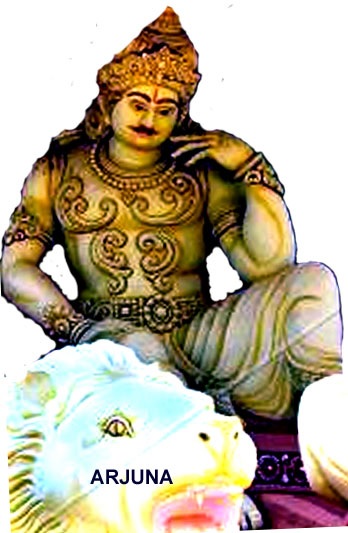
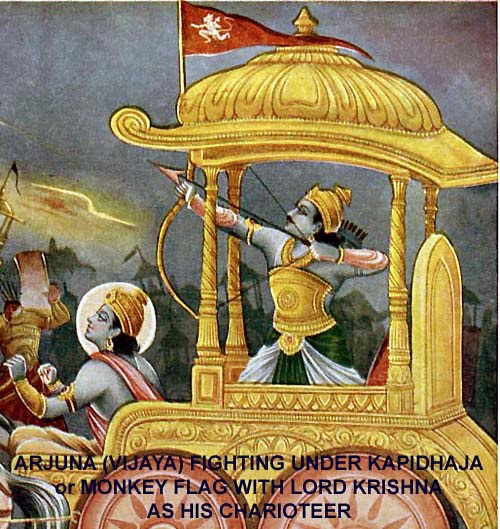
![]()

Click here to visit the Contents of the Part 1.
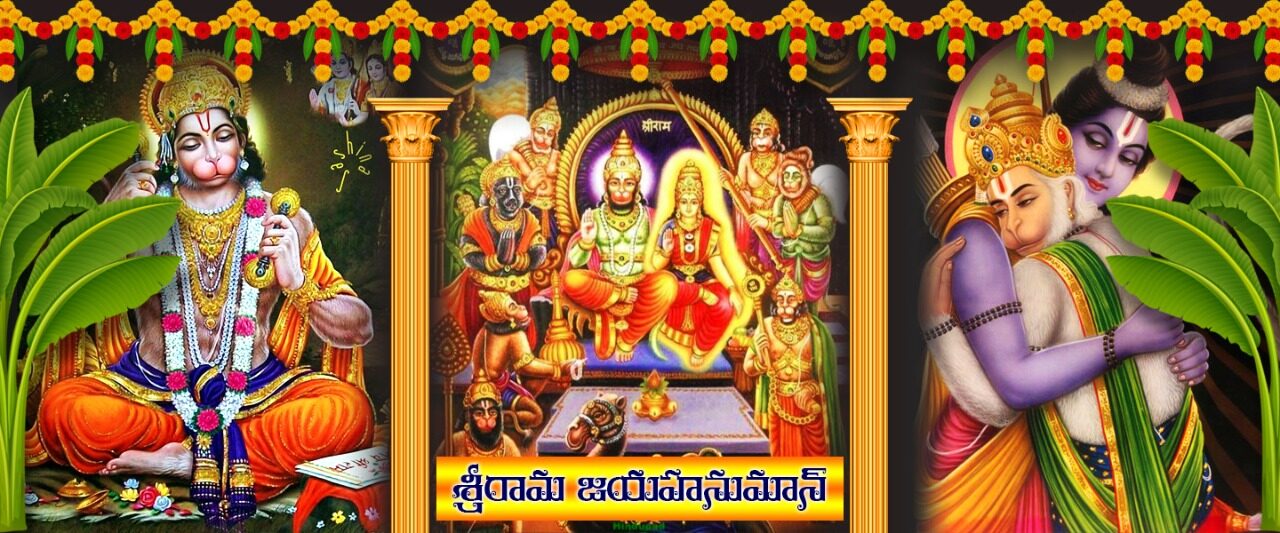
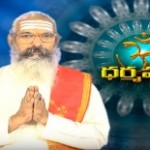
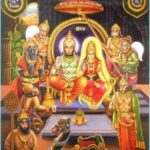
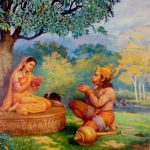
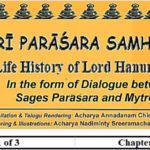

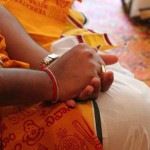
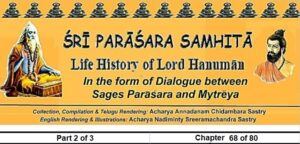
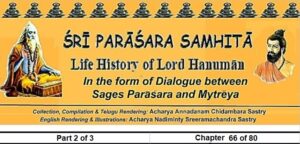
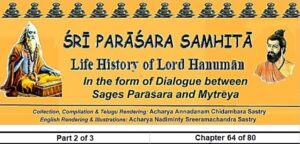
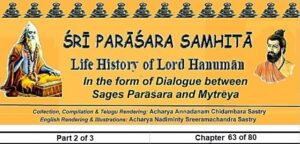
Be First to Comment